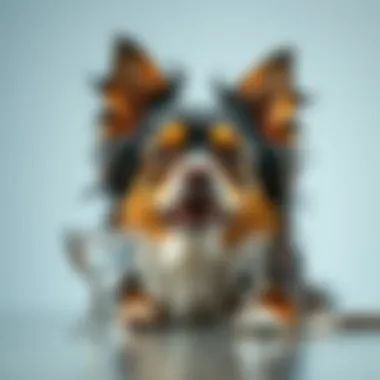Dietary Solutions for Diarrhea in Chihuahuas


Intro
In a world where the tiniest of pooches can endure some rather colossal health issues, understanding the proper dietary solutions for Chihuahuas facing diarrhea becomes paramount. Chihuahuas, with their unique physiological makeup and spirited personalities, often require tailored approaches when managing their health. Diarrhea, while a common ailment in dogs, can be particularly concerning in this small breed, as it may lead to rapid dehydration due to their petite size.
As a Chihuahua owner, you might find yourself juggling various dietary choices while trying to ease your furry friend’s discomfort. From selecting the right kind of food to ensuring adequate hydration, the path to recovery is often riddled with decisions that can greatly affect your pet’s well-being. This article aims to equip you with essential insights, guiding you through food alternatives, hydration strategies, and potential underlying health issues that may contribute to digestive disturbances. Understanding these factors is key in not only alleviating immediate symptoms but also in ensuring a balanced diet that supports your pet’s long-term health.
Let’s dive deeper into the various aspects of caring for a Chihuahua during such distressing times.
Intro to Chihuahua Digestive Health
Chihuahuas, though small in stature, have unique digestive systems that require attention and care. Understanding Chihuahua digestive health is crucial, especially when faced with issues like diarrhea, which many owners encounter. This article aims to demystify the intricacies of their digestive sensitivities, the causes of diarrhea, and the dietary solutions that can help maintain their health.
A Chihuahua's digestive health is the foundation of their overall well-being. They are particularly susceptible to gastrointestinal disturbances due to their size, breed characteristics, and sometimes, their dietary habits. Issues like diarrhea can stem from a variety of sources, including stress, dietary changes, and even underlying health conditions. Therefore, recognizing the importance of monitoring their diet and hydration is essential for pet owners.
Key elements to consider in this discussion include the nutritional needs specific to Chihuahuas, what signs to look out for indicating distress, and effective management strategies for diarrhea. Understanding these aspects will enable pet owners to make informed decisions regarding their Chihuahua's diet and health needs.
Regular monitoring of a Chihuahua’s feeding habits and reactions to various foods is prudent and can lead to early identification of any issues. A well-informed owner can act swiftly, ensuring that minor instances of diarrhea do not escalate into more serious health concerns.
"A sound digestion is the key to a happy Chihuahua, and never underestimate the power of a balanced diet."
In the subsequent sections, we will delve deeper into specific challenges faced by Chihuahuas, particularly focusing on their digestive sensitivities and common causes behind diarrhea.
Initial Assessment of Diarrhea
When your Chihuahua exhibits signs of diarrhea, the initial assessment is key. A careful examination helps you gauge the situation effectively, ensuring that you address any concerns promptly. Recognizing the symptoms and understanding how severe the issue is can be vital in preventing future complications and guiding your actions. The right steps taken at this stage can make all the difference in your pet’s recovery journey.
Identifying Symptoms and Severity
Recognizing the specific symptoms your Chihuahua is showing helps in determining how serious the situation might be. Diarrhea can vary in its appearance, frequency, and accompanying signs. Here are a few pointers to keep an eye on:
- Frequency and Consistency: Is it happening multiple times a day? Is the stool liquid, or does it have any unusual color or consistency? These factors can indicate whether it’s a mild or severe case.
- Presence of Accompanying Symptoms: Look for vomiting, lethargy, or loss of appetite. If your Chihuahua seems unusually tired and doesn't want to play or eat, that’s cause for concern.
- Sudden Changes: Note if this diarrhea came on suddenly or if it’s been a lingering issue, which can point to different underlying problems.
Documenting these symptoms can provide valuable insight for your veterinarian if a consultation becomes necessary. For example, an increase in lethargy or the presence of blood in the stool are red flags.
When to Consult a Veterinarian
Deciding when to call the vet can be tricky. You might have an instinct to act quickly, or you might hesitate, thinking it's just a passing issue. Here are some guidelines to help you make that decision effectively:
- Duration of Symptoms: If diarrhea persists for 24 hours or longer, especially in combination with other symptoms like vomiting or loss of appetite, it’s wise to reach out.
- Severity: Severe diarrhea or any occurrence of blood should not be taken lightly. This could be a sign of a serious condition that requires immediate professional intervention.
- Underlying Health Issues: If your Chihuahua has pre-existing health conditions or is quite young or elderly, prompt veterinary help should be a priority.
A good benchmark is always to err on the side of caution. If you’re feeling uncertain about your pet’s health, contacting a veterinarian is a prudent move. Remember, they might ask questions about your observations, so being prepared with details from your initial assessment can be tremendously helpful.
Important Note: Quick action can save you from larger issues down the line. Keeping a keen eye can mean the difference in treatment plans that might arise from your Chihuahua's condition.
Hydration: The First Step in Management
Managing diarrhea in Chihuahuas requires immediate attention to hydration. When a dog suffers from diarrhea, they can lose a considerable amount of fluids swiftly, which can lead to dehydration. This can be serious, particularly in small breeds like Chihuahuas. Ensuring that your pet stays hydrated not only helps to maintain their overall health but also supports the recovery process by promoting effective digestion and absorption of nutrients.
Importance of Rehydration


Rehydration can mean the difference between a mild episode and a serious health issue. When a Chihuahua loses fluids, it can quickly become lethargic and disoriented. Even mild dehydration affects a dog's energy levels, making them less likely to engage in their usual activities. Furthermore, without enough fluids, the digestive system struggles to function properly, exacerbating the diarrhea problem. Timely rehydration helps to balance electrolytes lost during the episode, which is crucial for cellular function and overall well-being.
Methods to Ensure Adequate Fluid Intake
Keeping your Chihuahua properly hydrated is essential, and here are several effective methods:
Offering Electrolyte Solutions
Electrolyte solutions are a key component in maintaining hydration during episodes of diarrhea. These solutions often contain a mix of water, salts, and sugars, which help replenish lost electrolytes effectively. One prominent characteristic of these solutions is that they are designed specifically to mimic the natural fluid balance in dogs.
Offering electrolyte solutions can be a beneficial choice as they not only hydrate but also support the recovery of the gastrointestinal tract. A unique feature of these solutions is their appeal; many dogs find the taste more palatable than plain water, encouraging them to drink more. However, you should be cautious to choose products specifically formulated for pets to avoid any harmful ingredients.
Encouraging Water Consumption
Promoting water intake is an obvious yet often overlooked strategy. Many dog owners don't realize that Chihuahuas, despite their tiny size, can be quite picky about their drinking habits. Encouraging water consumption can be crucial when they are recovering from diarrhea. Offer fresh water, and consider using a clean dish that can make drinking more inviting.
A unique aspect of encouraging water intake involves experimenting with the temperature or adding ice cubes, which some dogs find interesting. Consider also the location; placing the water bowl in a place where the dog feels comfortable might entice them to drink more. However, too much emphasis on water can be counterproductive if it leads to quick drinking and subsequent vomiting, which can worsen dehydration.
Utilizing Wet Food Options
Introducing wet food during a bout of diarrhea serves a dual purpose. Wet food not only provides nutrition but also adds moisture to your Chihuahua's diet, making it easier for them to stay hydrated and nourished at the same time. One key characteristic of wet food is its high moisture content, which can help increase fluid intake without forcing them to drink more water.
Additionally, using wet food options can be an appealing way to encourage a Chihuahua that may not feel like eating dry kibble due to their illness. Though it's important to choose high-quality wet food that is easy to digest, be cautious as some products may be too rich or contain ingredients that could exacerbate digestive issues.
A well-hydrated dog has a better chance of fighting through diarrhea, leading to a faster recovery.
Dietary Adjustments During Diarrhea
When it comes to managing diarrhea in Chihuahuas, dietary adjustments play a pivotal role. This compact breed often faces digestive sensitivities that can complicate recovery from intestinal distress. Correctly tailored diets not only provide immediate relief but also promote long-term gastrointestinal health. It’s essential to focus on food choices that are gentle yet effective, offering the right blend of nutrition, hydration, and palatability. Owners should also consider their Chihuahua's unique tolerance levels and preferences when making these adjustments.
Recommended Temporary Diets
Temporary dietary changes can set the stage for a smoother recovery. They offer a simplified approach to feeding, making it easier for a dog’s digestive system to process nutrients without causing additional irritation.
Plain Rice and Chicken
One of the best-known choices for a Chihuahua experiencing diarrhea is plain rice and chicken. This combination is fantastic for various reasons. First off, it’s easy on the stomach. The simplicity of boiled chicken, without any seasoning, paired with plain white rice helps to calm upset intestines. Moreover, the chicken provides quality protein, which is crucial for recovery without overburdening the digestive system.
A unique feature of this diet is its balance; it allows for gradual reintroduction of regular foods once the immediate symptoms subside. However, it's important for owners to monitor their pets closely to ensure they don't develop any food aversions while on this bland diet.
Boiled Potatoes
Another option that can be quite beneficial is boiled potatoes. Rich in carbohydrates yet easy to digest, plain potatoes provide energy without adding excessive fat or irritating ingredients. When made into a mushy consistency, they can act as a digestive aid.
From a key characteristic standpoint, potatoes are naturally soothing and can help to bulwark a Chihuahua's gut flora. Owners should avoid adding butter or any seasonings, as these can complicate digestive issues. The way they help maintain energy levels without causing further distress makes boiled potatoes a commendable choice.
Pumpkin and Yogurt Mix
A less common yet effective temporary diet is the mix of pumpkin and yogurt. Pumpkin is high in soluble fiber, which can help firm up loose stools. Additionally, it’s low in calories while being rich in vitamins, making it a health-packed option during recovery. The inclusion of plain yogurt introduces probiotics, promoting good gut bacteria that might be out of sorts due to diarrhea.


This mix not only supports recovery but also tastes good enough to entice even the pickiest eaters. However, it’s crucial to choose plain, unsweetened yogurt to avoid unnecessary sugars and additives, enabling the Chihuahua to get the most benefit.
Avoiding Problematic Foods
While certain foods can enhance recovery, others can spell trouble for a Chihuahua’s system. Identifying and avoiding problematic foods is just as crucial during this delicate time.
Dairy Products
Dairy products are one of the prime ingredients to steer clear of. Many Chihuahuas exhibit lactose intolerance, which means dairy can lead to worsening diarrhea or additional gastrointestinal distress. Even otherwise mild digestion issues can be exacerbated by something as seemingly innocuous as a splash of milk or a few spoonfuls of cheese. It’s best to keep these foods off the menu entirely during recovery phases.
High-Fat Foods
High-fat foods are another category that warrants caution. While all dogs require fat in their diets, too much fat can lead to digestive chaos, especially when a dog is already experiencing diarrhea. Fat can be hard to digest and has the potential to cause further irritation or imbalance in the gut. For this reason, opting for low-fat options is often wiser until normal bowel movements resume.
Spicy Ingredients
Spicy ingredients should definitely be avoided when managing Chihuahua diarrhea. These foods can trigger stomach upset, cramping and worsen an already sensitive digestive tract. Even mild spices can provoke discomfort in small breeds. Keeping the diet bland and non-spicy will help ensure that recovery goes smoothly and quickly.
Probiotics and Their Role
Probiotics have become a buzzword in the pet health industry, particularly regarding their role in improving digestive health. For Chihuahuas who are experiencing diarrhea, probiotics can prove invaluable. These live microorganisms may seem insignificant, yet they work behind the scenes to balance the intestinal flora. Their presence can facilitate government overactive digestive systems and promote the growth of good bacteria. The beauty of probiotics is that they can help in many ways, providing the digestive system with a friendlier environment to recover from disturbances.
Benefits of Probiotics for Chihuahuas
Understanding the benefits of probiotics is crucial for any Chihuahua owner. These microorganisms can be the difference between a frail stool and a solid one. Here are some specific benefits:
- Restoration of Gut Flora: With diarrhea, the natural balance of gut bacteria often gets upset. Probiotics help restore that balance.
- Improved Digestion: They aid in breaking down food more effectively, which means that your Chihuahua can absorb more nutrients.
- Enhanced Immunity: A healthy gut is strongly linked with a robust immune system. Probiotics bolster your pup's defenses against various health issues.
- Reduction in Diarrhea Duration: Studies indicate that the use of probiotics can potentially shorten the duration of diarrhea episodes in dogs.
To sum it up, incorporating probiotics into your Chihuahua's dietary plan can lead to numerous benefits. It’s like giving them an invisible shield that can provide protection while aiding recovery.
Recommended Probiotic Products
With various probiotic products available in the market, making an informed choice can become overwhelming. However, some brands stand out for their effectiveness and quality. Here are a few recommended probiotic products suitable for Chihuahuas:
- Purina Pro Plan Veterinary Diets FortiFlora: This product is well-regarded for its formula that contains beneficial live probiotics. Many dogs seem to respond positively to it.
- VetriScience Probiotic Everyday: An excellent option that is easy to administer, these soft chews can make a significant difference in gut health.
- PetVitality Probiotics: These are formulated specifically for small breeds, making them ideal for Chihuahuas, ensuring they get the right dosage without the unnecessary bulk.
- Prebiotics and Probiotics Chews by Zesty Paws: These chews are not just delicious but also ensure a balance of bacteria in your Chihuahua's gut.
"Choosing the right probiotic is like finding the right key for a lock; it’s essential for unlocking your pet's true digestive potential."
Before introducing any probiotic product, consult your veterinarian to determine the best option for your furry companion. It's vital to pick the right product, as not all probiotics are created equal. Paying attention to ingredients, live cultures, and probiotic strains can lead you to the best choice.
Monitoring Recovery and Adjustment
Monitoring recovery and adjustment during episodes of diarrhea in Chihuahuas is crucial for pet owners. This process is not only about ensuring your pet's digestive distress is alleviated but also about understanding the long-term implications on their overall health. A careful and methodical approach can help in identifying any underlying issues and prevent future occurrences.
Why is this Important? Keeping an eye on how your Chihuahua responds post-recovery gives insights into their health. Each time they experience diarrhea, the body undergoes stress, and a deep dive into their recovery patterns can shed light on potential food sensitivities or allergies. Moreover, understanding what adjustments may be needed in their diet will help maintain a healthy digestive system.
Benefits of Monitoring 1. Early Detection of Issues: Regular checks enable pet owners to catch signs of recurrent problems before they escalate, ensuring that your fur friend doesn't go through unnecessary suffering.
- Tailored Diet Adjustments: By observing their reactions to reintroduced foods, you can tailor their diet to best suit their digestive needs.
- Boosted Overall Well-being: A well-managed recovery not only promotes digestive health but also enhances their energy levels and mood.


Considerations About Monitoring
- Keep a Journal: Documenting each stage of your pet's recovery can provide a clearer picture. Note down their food intake, any changes in behavior, and bathroom habits. This might help spot patterns over time.
- Gradual Changes: When reintroducing regular foods, do so gradually. This allows a smoother transition and minimizes potential issues.
- Vigilance for Red Flags: Be aware of any persistent symptoms like increased lethargy, refusal to eat, or abdominal discomfort. Such signs may indicate a deeper health issue and warrant immediate vet consultation.
"Monitoring recovery not only aids in immediate remedy but prepares you and your Chihuahua for a healthier future."
Gradual Reintroduction of Regular Diet
The gradual reintroduction of a regular diet is an essential step in your Chihuahua’s recovery process. This transition should follow a period of eating bland, easily digestible foods. The emphasis here is on caution; a sudden return to their usual diet can lead to a resurgence of diarrhea.
Start by offering small portions of their regular diet, mixed with the mild foods they’ve been consuming. Opt for about 75% of their bland diet mixed with 25% of the regular food. Monitor their response closely. If all goes well, you can progressively raise the percentage of their usual food over the course of several days.
It is vital to remain attentive to any adverse reactions. If diarrhea reoccurs, it might indicate that certain foods are best left off their plate or require further spport.
Signs of Recovery to Look For
After a bout of diarrhea, spotting the signs of recovery in your Chihuahua provides peace of mind. Some indicators of improvement include:
- Normal Stool Consistency: Progress from watery stools to more formed ones is a clear sign that your Chihuahua's digestive system is returning to normal.
- Increased Energy Levels: A return to their playful and lively self reflects overall recovery. If your Chihuahua starts chasing the postman or their favorite toy, that's a good sign.
- Healthy Appetite: If your pet shows interest in food after a period of avoidance, it indicates they're feeling better. Encouraging them with smaller meals can help.
- Stable Weight: Maintain regular weight checks to ensure your Chihuahua is not losing pounds unexpectedly during recovery.
Recognizing these signs is essential. As soon as you see positive changes, it’s a great motivator to stick to the dietary adjustments made, ensuring your Chihuahua stays happy and healthy.
Preventive Measures for Future Incidents
Understanding how to prevent further incidents of diarrhea in Chihuahuas is as vital as addressing them when they occur. This section offers practical insights into maintaining a healthy digestive system for your furry friend, ultimately reducing the chances of recurring digestive issues. The old saying "an ounce of prevention is worth a pound of cure" rings particularly true when it comes to Chihuahua health.
Regular Diet Management
A stable and balanced diet forms the cornerstone of your Chihuahua’s well-being. When managing their meals, keeping things consistent is important. Chihuahuas are prone to digestive sensitivities, which makes feeding them well crucial. Here are some essential tips for proper diet management:
- Stick to High-Quality Food: Quality counts. Choose a nutritious dog food that meets AAFCO standards, ensuring it’s specifically formulated for small breeds. This not only provides appropriate nutrients but also minimizes digestive upset.
- Avoid Human Food: The occasional treat might seem harmless but human foods can lead to stomach upset. Foods like onions, chocolate, or anything rich can trigger issues.
- Gradual Changes: If you need to switch their food, do so gradually. Mixing a small amount of the new food with their current food helps reduce the chances of diarrhea. This can be done by a small 25% new food to 75% old food ratio for the first few days, gradually increasing the new food.
- Monitor Portions: Overfeeding can lead to digestive distress. Use measuring cups to ensure that you’re serving the recommended portion sizes based on your dog’s weight.
Making these dietary adjustments can significantly impact their digestive health, setting the foundation to lessen the likelihood of future issues.
Routine Veterinary Health Checks
Regular veterinary appointments cannot be overstated. These checks serve as a proactive approach to your Chihuahua’s health. Just like keeping an eye on the road ahead while driving helps avoid accidents, regular vet visits help you detect potential problems before they escalate.
- Schedule Regular Check-Ups: These visits allow the veterinarian to assess your dog’s overall health, discuss any dietary changes, and monitor for any underlying health conditions that may influence their digestion. Regular visits should ideally happen at least once a year, or more often for senior Chihuahuas.
- Stay Up-to-Date on Vaccinations: Vaccines protect against diseases that can lead to diarrhea, such as parvovirus or distemper. Ensure vaccinations are current.
- Discuss Dietary Issues: During vet visits, don’t hesitate to bring up any digestive concerns. This can provide valuable insights into potential dietary modifications or supplemental options.
"Prevention is not only better than cure; it's essential for a happy pet."
Following these preventive measures contributes not just to avoiding incidents of diarrhea, but overall enhanced health and quality of life for your Chihuahua. Having a proactive plan can make all the difference in your furry companion’s well-being.
Epilogue
The topic of managing diarrhea in Chihuahuas holds significant importance, notably for pet owners who aim to ensure their furry companions remain healthy and happy. Understanding the dietary solutions available is fundamental. It’s not just about alleviating symptoms; it’s about identifying the underlying issues that may lead to gastrointestinal disturbances. This attention to detail and care can lead to a deeper bond between the owner and the pet, expanding beyond mere management to nurturing overall well-being.
Recapping the key points, hydration emerges as the first and foremost step to take when dealing with diarrhea. Fluid management cannot be overemphasized. It prevents dehydration, which can escalate recovery time and exacerbate health complications. Next, incorporating a temporary diet can aid in easing the digestive system without overwhelming it. Whether it’s plain rice and chicken or a mix of pumpkin and yogurt, these dietary adjustments can provide comfort and stability.
Moreover, the utilization of probiotics opens up new avenues for maintaining gut health. Introducing beneficial bacteria can optimize digestion and ensure a quicker return to normalcy. Continuous monitoring for signs of improvement, including how soon a dog starts to regain energy and proper bathroom habits, is also vital.
In addition, preventive measures such as regular veterinary health checks and carefully managed diets can further diminish the likelihood of future incidents. Keeping a close watch on their regular meals and avoiding known irritants will go a long way in safeguarding their digestive health.
"Prevention is better than cure."



